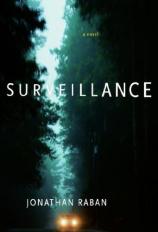Surveillance
Review
Surveillance
Tad Zachary is an actor, making ends meet by performing in Homeland
Security disaster enactments. Outliving his lover but not escaping
HIV, he spends his nights trolling the Internet, searching out
conspiracy theories to bolster his hateful contempt for the
government.
Yet he truly (and platonically) loves his longtime neighbor Lucy
Bengstrom, a journalist, and especially her 12-year-old daughter,
Alida. Lucy, a 50-ish single mother, competes with an iPod for her
kid's attention while researching a magazine article on August
Vanags, a retired history professor who has written a phenomenally
successful memoir of his dire youth in a Nazi concentration camp.
The story unfolds during an uncomfortably warm Seattle spring in
the not-too-distant future, where security roadblocks on I-5 are
permanent and national ID cards are mandatory.
Living near Seattle and routinely commuting by ferry, some of
Jonathan Raban's descriptions are uncomfortably easy for me to
imagine. "Two lanky National Guardsmen, with machine guns on
shoulder, stood by the ramp, eyes glazed, faces limp with boredom
in the gathering heat." Okay, so they're Coast Guard, not National
Guard, but these guys I've seen. It's not such a huge stretch to
this: "Humvees were everywhere now, lurking in downtown alleys,
snarling at drivers from the median strips on freeways; they seemed
to Lucy to possess the worst possible combination of maximal
testosterone and minimal IQ."
Nothing is as it appears in this novel. Raban inhabits four widely
varying points of view --- that of Tad, Lucy, Alida and their new
landlord, Lee, a Chinese immigrant of dubious legality who lives in
his strip mall office and who woos Lucy with a gift copy of a
really good book: WHO MOVED MY CHEESE? As Lucy gets to know August
Vanags and his wife at their Whidbey Island waterfront home on
Useless Bay, she becomes increasingly uneasy with the similarities
she finds between his memoir and other, more obscure Holocaust
memoirs. She disagrees with Vanags's conservative politics and
wonders if his memoir could be a hoax, but she warms to his
intelligence and kindness to Alida, to the point where she
questions her own journalistic objectivity. Tad naturally despises
the idea of Vanags: both his politics and his rivalry as
father-figure to Alida.
Lee would think all these concerns ridiculous if he thought of them
at all. An outsider like Vanags, he appreciates the US of A more
than the American-born characters, although it is capitalism he
admires, not political freedom. He has graduated from running
parking lots to apartment building ownership, a fact that he's
immensely proud of. All he needs now is a wife, an American one,
past childbearing age, and his ambitious eye lands on Lucy.
Raban demonstrates his considerable novelistic skill describing
Alida's life in junior high, negotiating alliances and boys and
coveting the websites of friends. She's smart and still young
enough to believe that there is algebra to human equations --- that
if she gathers enough evidence and applies her reductive powers, an
answer will be left, shining and unquestionable. During the course
of the novel she comes to suspect that no situation involving
humans can ever be so cut and dried.
It is Alida's viewpoint that Raban chooses for the final chapter,
which carries a strong whiff of deus ex machina. Given the
environmental concerns of the novel, this perhaps is not entirely
out of place. Be warned: Those who desire conclusions and answers
will not find them at the end or, for that matter, anywhere else in
this book. But those who savor an artful, troublesome set of
questions have come to the right place.
Reviewed by Eileen Zimmerman Nicol on January 24, 2011
Surveillance
- Publication Date: January 30, 2007
- Genres: Fiction
- Hardcover: 272 pages
- Publisher: Pantheon
- ISBN-10: 0375422447
- ISBN-13: 9780375422447




